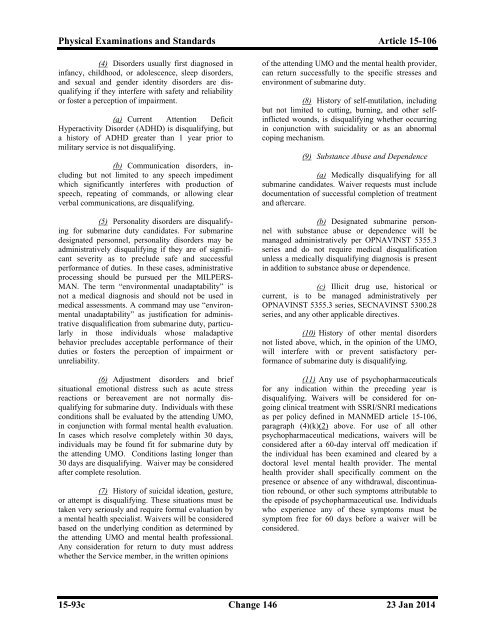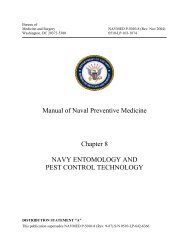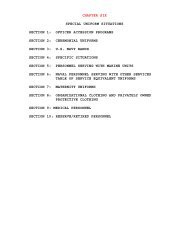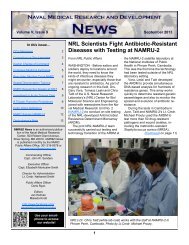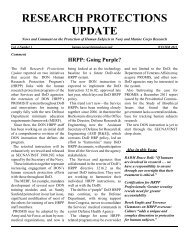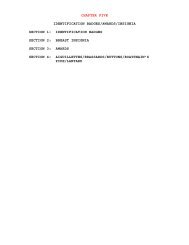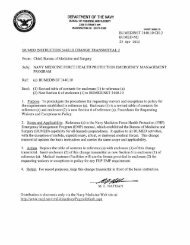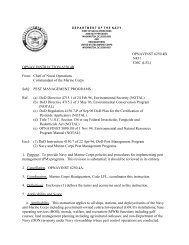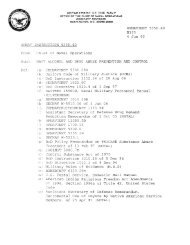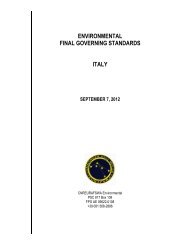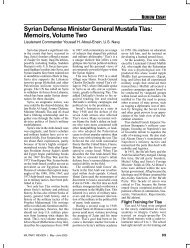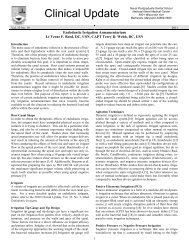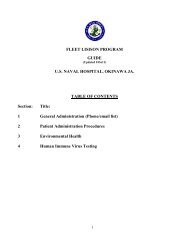Change 146 Manual of the Medical Department ... - Navy Medicine
Change 146 Manual of the Medical Department ... - Navy Medicine
Change 146 Manual of the Medical Department ... - Navy Medicine
Create successful ePaper yourself
Turn your PDF publications into a flip-book with our unique Google optimized e-Paper software.
Physical Examinations and Standards Article 15-106<br />
(4) Disorders usually first diagnosed in<br />
infancy, childhood, or adolescence, sleep disorders,<br />
and sexual and gender identity disorders are disqualifying<br />
if <strong>the</strong>y interfere with safety and reliability<br />
or foster a perception <strong>of</strong> impairment.<br />
(a) Current Attention Deficit<br />
Hyperactivity Disorder (ADHD) is disqualifying, but<br />
a history <strong>of</strong> ADHD greater than 1 year prior to<br />
military service is not disqualifying.<br />
(b) Communication disorders, including<br />
but not limited to any speech impediment<br />
which significantly interferes with production <strong>of</strong><br />
speech, repeating <strong>of</strong> commands, or allowing clear<br />
verbal communications, are disqualifying.<br />
(5) Personality disorders are disqualifying<br />
for submarine duty candidates. For submarine<br />
designated personnel, personality disorders may be<br />
administratively disqualifying if <strong>the</strong>y are <strong>of</strong> significant<br />
severity as to preclude safe and successful<br />
performance <strong>of</strong> duties. In <strong>the</strong>se cases, administrative<br />
processing should be pursued per <strong>the</strong> MILPERS-<br />
MAN. The term “environmental unadaptability” is<br />
not a medical diagnosis and should not be used in<br />
medical assessments. A command may use “environmental<br />
unadaptability” as justification for administrative<br />
disqualification from submarine duty, particularly<br />
in those individuals whose maladaptive<br />
behavior precludes acceptable performance <strong>of</strong> <strong>the</strong>ir<br />
duties or fosters <strong>the</strong> perception <strong>of</strong> impairment or<br />
unreliability.<br />
(6) Adjustment disorders and brief<br />
situational emotional distress such as acute stress<br />
reactions or bereavement are not normally disqualifying<br />
for submarine duty. Individuals with <strong>the</strong>se<br />
conditions shall be evaluated by <strong>the</strong> attending UMO,<br />
in conjunction with formal mental health evaluation.<br />
In cases which resolve completely within 30 days,<br />
individuals may be found fit for submarine duty by<br />
<strong>the</strong> attending UMO. Conditions lasting longer than<br />
30 days are disqualifying. Waiver may be considered<br />
after complete resolution.<br />
(7) History <strong>of</strong> suicidal ideation, gesture,<br />
or attempt is disqualifying. These situations must be<br />
taken very seriously and require formal evaluation by<br />
a mental health specialist. Waivers will be considered<br />
based on <strong>the</strong> underlying condition as determined by<br />
<strong>the</strong> attending UMO and mental health pr<strong>of</strong>essional.<br />
Any consideration for return to duty must address<br />
whe<strong>the</strong>r <strong>the</strong> Service member, in <strong>the</strong> written opinions<br />
<strong>of</strong> <strong>the</strong> attending UMO and <strong>the</strong> mental health provider,<br />
can return successfully to <strong>the</strong> specific stresses and<br />
environment <strong>of</strong> submarine duty.<br />
(8) History <strong>of</strong> self-mutilation, including<br />
but not limited to cutting, burning, and o<strong>the</strong>r selfinflicted<br />
wounds, is disqualifying whe<strong>the</strong>r occurring<br />
in conjunction with suicidality or as an abnormal<br />
coping mechanism.<br />
(9) Substance Abuse and Dependence<br />
(a) <strong>Medical</strong>ly disqualifying for all<br />
submarine candidates. Waiver requests must include<br />
documentation <strong>of</strong> successful completion <strong>of</strong> treatment<br />
and aftercare.<br />
(b) Designated submarine personnel<br />
with substance abuse or dependence will be<br />
managed administratively per OPNAVINST 5355.3<br />
series and do not require medical disqualification<br />
unless a medically disqualifying diagnosis is present<br />
in addition to substance abuse or dependence.<br />
(c) Illicit drug use, historical or<br />
current, is to be managed administratively per<br />
OPNAVINST 5355.3 series, SECNAVINST 5300.28<br />
series, and any o<strong>the</strong>r applicable directives.<br />
(10) History <strong>of</strong> o<strong>the</strong>r mental disorders<br />
not listed above, which, in <strong>the</strong> opinion <strong>of</strong> <strong>the</strong> UMO,<br />
will interfere with or prevent satisfactory performance<br />
<strong>of</strong> submarine duty is disqualifying.<br />
(11) Any use <strong>of</strong> psychopharmaceuticals<br />
for any indication within <strong>the</strong> preceding year is<br />
disqualifying. Waivers will be considered for ongoing<br />
clinical treatment with SSRI/SNRI medications<br />
as per policy defined in MANMED article 15-106,<br />
paragraph (4)(k)(2) above. For use <strong>of</strong> all o<strong>the</strong>r<br />
psychopharmaceutical medications, waivers will be<br />
considered after a 60-day interval <strong>of</strong>f medication if<br />
<strong>the</strong> individual has been examined and cleared by a<br />
doctoral level mental health provider. The mental<br />
health provider shall specifically comment on <strong>the</strong><br />
presence or absence <strong>of</strong> any withdrawal, discontinuation<br />
rebound, or o<strong>the</strong>r such symptoms attributable to<br />
<strong>the</strong> episode <strong>of</strong> psychopharmaceutical use. Individuals<br />
who experience any <strong>of</strong> <strong>the</strong>se symptoms must be<br />
symptom free for 60 days before a waiver will be<br />
considered.<br />
15-93c <strong>Change</strong> <strong>146</strong> 23 Jan 2014


